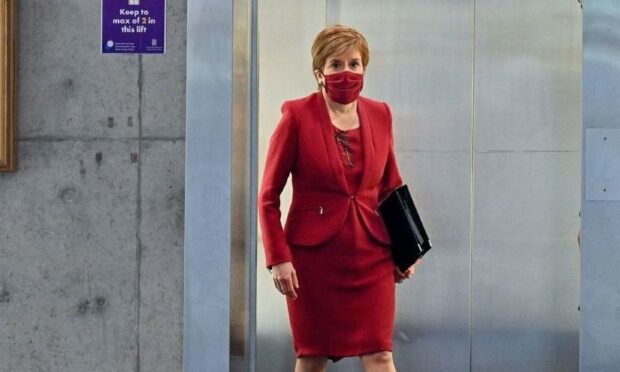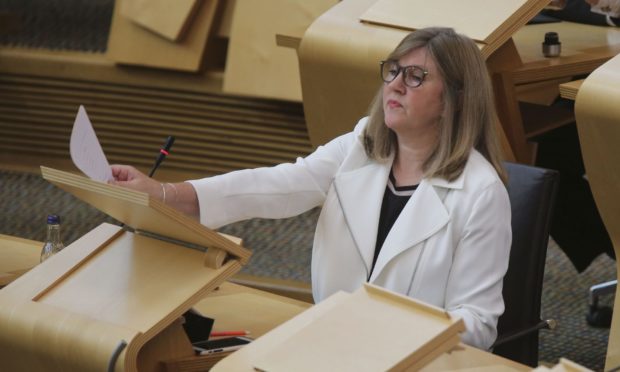The controversial decision to ban travel between Scotland and Manchester is causing people to abandon plans including scattering ashes of a loved one, Mayor Andy Burnham claimed.
The city leader raised real-life examples including marriage and honeymoons, walking tours and major losses to hotel bookings.
Mr Burnham hit back in the latest escalation of the row, which also dominated exchanges at Holyrood before Tuesday’s covid statement from First Minister Nicola Sturgeon.
Opposition MSPs demanded answers from her deputy, John Swinney, who again said the Scottish Government will not compensate people and businesses.
The SNP Government had announced the measure last week, prompting anger at the lack of discussion with Mr Burnham.
It was pointed out Dundee had a worse rate of infection than the English region at the time.
The mayor, at a press conference on Tuesday, said he expects to speak to the First Minister on Wednesday.
He said around 50 emails had been sent to his office about the ban. Examples included a marriage in Gretna and honeymoon tour of Scotland, now in jeopardy. A group of walkers, who he said had all been double-vaccinated, were in Scotland and not sure what to do next.
He also said a family had been planning to visit and scatter ashes but had now postponed the plan.
Mr Burnham said a hotel reported losses amounting to 200 room-nights.
He also said the ban was difficult to enforce by local police and suggested the same view was held by officers in Scotland.
‘We will want clarity’
However, he would not contradict Scottish Government policy.
“I anticipate having the opportunity to discuss it with the First Minister tomorrow and obviously we will want clarity on elements of the policy that are currently unclear to us in terms of the criteria that are being used here, the exit strategy, the process for lifting the restrictions on the boroughs affected,” he said.
“We just want to seek resolution and a better way of doing things going forward. The political route is the route to pursue. That’s obviously what we would seek to do. To put in place better dialogue, better lines of communication which clearly aren’t there at the moment.”
On Tuesday, Mr Swinney said compensation from north of the border is not appropriate.
“We are all responsible for putting in place, in our respective parts of the United Kingdom, the financial support to arrangements for business and that’s exactly what the Government will continue to do here in Scotland,” he said.
Earlier in the session, Holyrood’s Presiding Officer, Alison Johnstone, rebuked the Scottish Government for how the change was announced.
Initially, a Government-initiated question – a written question from an SNP MSP which is used to announce policy – was answered by Mr Swinney on Thursday, detailing the change before it was announced publicly by Nicola Sturgeon on Friday at the coronavirus briefing.
The Scottish Parliament was, however, in session on Thursday and Ms Johnstone, along with opposition MSPs say the announcement could have been made then and scrutinised in Holyrood.
Government told to ‘reflect’
“Concerns have been raised regarding the use of a Government-initiated question to announce the addition of Manchester and Salford to the list of areas where common travel restrictions apply,” she said.
“I understand this mechanism has been used on earlier occasions to make such announcements. Notably, in this case the announcement was made by GIQ on Thursday, 17 June, a sitting day when there may have been an opportunity for members to scrutinise the decision in the chamber.
“I would therefore ask the minister for parliamentary business to reflect on whether GIQs are an appropriate method to use for these announcements on days when Parliament is sitting.”
In response, Mr Swinney, who is also the Covid Recovery Secretary said the Government would take the comments on board.
“I completely accept and respect the words that the Presiding Officer has expressed today and the Government will reflect very carefully on the point the Presiding Officer has made,” he said.
Mr Swinney went on to say a GIQ had been used to announce a similar travel ban at the end of May, however, it was pointed out by the Tory leader, Douglas Ross, that Parliament was not sitting on the day the announcement was made.

